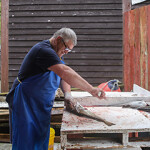ASC expands Think Fish Week campaign to Central Europe

Engaging with consumers on the topic of responsible aquaculture is becoming an increasingly important role for the Aquaculture Stewardship Council (ASC), which stepped up its promotional campaign efforts in the latter months of 2020, as it celebrated its 10th anniversary.
The ASC now was more than 1.6 million metric tons (MT) of aquaculture products under certification, with Norway, Chile, and Vietnam accounting for the largest volumes. In terms of products, salmon has the largest share, with just over 1 million MT certified, shrimp is in second place with 242,000 MT, and tilapia comes third, with nearly 106,000 MT certified.
ASC joined with the Marine Stewardship Council (MSC) to organize an annual Think Fish Week in the Netherlands and Belgium. Encouraged by the success of this campaign, ASC has since reached out globally, organizing both its own and joint promotional events with MSC in France, Sweden, Japan, and Australia. Successful campaigns in Germany, Austria, and Switzerland were run for the first time in 2020.
“There is a growing need to raise public awareness about the role of certified seafood in helping to preserve our oceans, lakes, and rivers, and national seafood celebrations are an effective way to do this,” ASC Global Seafood Campaign Manager Merel den Held said. “We aim to create a fun, educational environment that allows consumers to engage with our messaging, increases recognition of our on-pack logo, and helps them to make conscious purchasing choices year-round.”
Anna Nau, ASC’s marketing manager for Germany, Austria, Switzerland, said the regional campaign followed a full year of research and preparation. It used the slogan “FischGewiss: Für Genuss mit Zukunft,” which roughly translates as fish reassured; enjoy it now and in the future.
“We were really excited to see the tangible results of the hard work that went into this campaign, which was a success, despite the many coronavirus restrictions our partners were dealing with,” she said.
ASC produced 50,000 copies of a FischGewiss newspaper supplement for distribution in Hamburg and Berlin, and a further 65,000 copies were made available at the fresh fish counters of supermarkets and through Deutsche See home delivery boxes. McDonald’s aired the campaign video in its 700-plus restaurants in Germany for the two weeks of the campaign, and a short film was also viewed by more than 90,000 people on YouTube and tens of thousands more through Facebook.
According to the ASC, the campaign was welcomed by supermarkets, fish suppliers, fish retailers, top brands, restaurants and food chains, who partner with ASC in a host of events, competitions, promotions, and tasting sessions. Nau and her team secured 34 commercial partners, including key retailers such as Lidl and Aldi in all three countries, Kaufland, Edeka, Netto Coop, tegut, and Spar in Switzerland, and brands like Escal, Iglo, and Gottfried. Zoo Köln in Germany and Tiergarten Schönbrunn in Austria also took part. And Think Fish Week in the Netherlands and Belgium, which partnered with nearly 70 retailers, producers, and fishmongers, teamed up with Hello Fresh, an online meal solution delivery company for the third year running. Hello Fresh distributed an ASC children’s book which is available in French, Dutch and Flemish, and features a fish hero named Omar, who talks about the wonders of the oceans, and the importance of protecting them by fishing sustainably and farming responsibly.
“Providing sufficient fish, not only now, but also to future generations. That is our main goal. Think Fish Week helps us to raise awareness among our customers to help us achieve that,” ALDI Belgium Corporate Responsibility Manager Ruth Broekaert told SeafoodSource.
Camille Civel, ASC’s market development manager for France and Belgium, said a survey of 1,000 Belgian consumers showed how much work remains in educating European consumers on seafood sustainability issues. The majority of those surveyed didn’t know where their seafood came from and couldn’t identify whether the 10 most popular fish species eaten in Belgium were caught or farmed. Nonetheless, sustainable and responsible management of seafood was cited as important by the majority (89 percent) of respondents, and a similar number (85 percent) valued traceability. Three quarters (77 percent) stated that local seafood was important to them, although 54 percent agreed that local products are not always the most sustainable, while 35 percent thought they were always the most sustainable.
“These findings demonstrate the challenges facing consumers who want to know where their seafood comes from, but don’t know how to find it out,” Civel said. “Choosing ASC products, which have been produced to strict standards of social and environmental responsibility, helps to take some of the confusion out of seafood shopping, and allows consumers to directly reward responsible farmers. This is one of the key messages our campaigns are helping to get across to consumers.”
Social media channels have proved particularly useful in spreading the campaign’s message, according to the ASC. In Japan, for example, the campaign reached an estimated 7.6 million contacts this year, helping to introduce the ASC and its work throughout the seafood-loving country, where a burgeoning seafood sustainability movement has blossomed in recent years.
Photo courtesy of Aquaculture Stewardship Council





Share